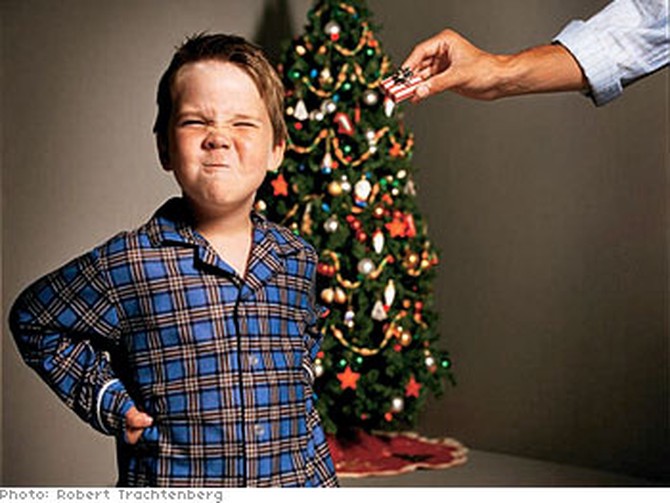Debunking 5 Holiday Myths

Myth 1: Family gatherings are torture.
Home for the holidays. The very image can cause us to develop excruciating holiday back spasms, sometimes as early as September—because the cliché of familial holiday bliss has an evil twin: that of the dysfunctional family at its worst. For the legion of CDFs (Children of Dysfunctional Families), don't assume that you can't enjoy family gatherings. With the right mental set, you can have a good, relaxing time at whatever festivities you attend, no matter how wacko your kinfolk may be.
The single best way to cope with familial turmoil is to give up the hope that your relatives will suddenly become cornucopias of emotional health. Instead of yearning for a perfect family, listen to teacher Byron Katie, author of the book I Need Your Love—Is That True? "If I had a prayer," she writes, "it would be this: 'God spare me from the desire for love, approval, and appreciation. Amen.'" This sounds harsh if you've never experienced freedom from these desires, which comes when you accept yourself. Try one of Katie's exercises: Imagine drinking a cup of tea with a family member, without attempting in any way to get love, approval, or appreciation. You'll suddenly feel safer, more resilient, more at peace. Paradoxically, you get this blessed feeling by not grasping for it. Make Katie's exercise a reality by considering your family holiday a BYOLAA event—bring your own love, approval, and appreciation. The philosopher Lao-tzu said that when you do this, "you naturally become tolerant, disinterested, amused, kindhearted as a grandmother."
It's far easier to let go of judgment or competitiveness and reach this contented place when you aren't intent on forcing people to be what they're not. And you invite inner peace when you stop trying to force yourself either to change your relatives or to think of them as sane. By acknowledging your own infinite value, you'll see more value in others—just as they are. You may even stumble across a surprising holiday gift: the understanding that truly "going home" happens within you, the moment you give yourself the unconditional acceptance you thought you needed from your kin.
— Martha Beck
The single best way to cope with familial turmoil is to give up the hope that your relatives will suddenly become cornucopias of emotional health. Instead of yearning for a perfect family, listen to teacher Byron Katie, author of the book I Need Your Love—Is That True? "If I had a prayer," she writes, "it would be this: 'God spare me from the desire for love, approval, and appreciation. Amen.'" This sounds harsh if you've never experienced freedom from these desires, which comes when you accept yourself. Try one of Katie's exercises: Imagine drinking a cup of tea with a family member, without attempting in any way to get love, approval, or appreciation. You'll suddenly feel safer, more resilient, more at peace. Paradoxically, you get this blessed feeling by not grasping for it. Make Katie's exercise a reality by considering your family holiday a BYOLAA event—bring your own love, approval, and appreciation. The philosopher Lao-tzu said that when you do this, "you naturally become tolerant, disinterested, amused, kindhearted as a grandmother."
It's far easier to let go of judgment or competitiveness and reach this contented place when you aren't intent on forcing people to be what they're not. And you invite inner peace when you stop trying to force yourself either to change your relatives or to think of them as sane. By acknowledging your own infinite value, you'll see more value in others—just as they are. You may even stumble across a surprising holiday gift: the understanding that truly "going home" happens within you, the moment you give yourself the unconditional acceptance you thought you needed from your kin.
— Martha Beck

Myth 2: If presents don't put you in debt, buying party clothes will
To look great at this season's countless special events, all you need to do is shop your closet, says Lloyd Boston, contributor to NBC's Today and author of the new book Before You Put That On: 365 Daily Style Tips for Her.
Start by wearing one color from head to toe for a chic, slimming look. "Stylists do this all the time," he says, "because it's a great way to use what you already have." To pull it off properly, Boston suggests a fitted black turtleneck and black trousers, winter white pants with your best white blouse, or a sweater set and skirt in an unexpected shade like pink, yellow, or coral ("sets you apart from Santa's helpers"). Look for anything that has a subtle shine, such as light-catching leather, suede, or matte satin.
For accessories, skip the miniature Christmas tree brooch and instead aim for simplicity: diamond studs, elegant pearls—real or fake—or three stacked bracelets on one arm with your shirt cuffs rolled up. "You might feel underdressed at first, but the look has a modern edge," says Boston. If you do want to buy something festive, try vintage stores for an inexpensive beaded bag or a fabulous pair of earrings. "Mix things up," advises Boston, "and trust your taste—that's what separates stylish women."
— Cindy M. del Rosario Tapan
Start by wearing one color from head to toe for a chic, slimming look. "Stylists do this all the time," he says, "because it's a great way to use what you already have." To pull it off properly, Boston suggests a fitted black turtleneck and black trousers, winter white pants with your best white blouse, or a sweater set and skirt in an unexpected shade like pink, yellow, or coral ("sets you apart from Santa's helpers"). Look for anything that has a subtle shine, such as light-catching leather, suede, or matte satin.
For accessories, skip the miniature Christmas tree brooch and instead aim for simplicity: diamond studs, elegant pearls—real or fake—or three stacked bracelets on one arm with your shirt cuffs rolled up. "You might feel underdressed at first, but the look has a modern edge," says Boston. If you do want to buy something festive, try vintage stores for an inexpensive beaded bag or a fabulous pair of earrings. "Mix things up," advises Boston, "and trust your taste—that's what separates stylish women."
— Cindy M. del Rosario Tapan

Myth 3: You'll scar the kids if you cut back on gifts.
No child has ever clapped her hands in glee at the idea of cutting back on presents, but there are a few things you can do to rein in your family's holiday materialism with minimal upset. Linda Sonna, PhD, author of The Everything Tween Book, recommends talking to older children about what they really want in advance. "Explain that if they get X, there won't be Y," she says. "That will make the child think about her priorities."
With some small adjustments, it can also seem as though there's just as much loot as last year. Wrap everything individually (a two-piece outfit or a toy with several parts, for example) so each child has more bundles with her name on them. Or think of small, fun things you can package as gifts. "If you have a rule against sugary cereal, wrap up a box of Cap'n Crunch," says Sonna. "Kids love coupons—give them each a voucher for one morning of not having to make their beds."
To help build excitement—and prolong the process—make the family open gifts one at a time, "instead of a mad dash where it's over in two seconds." And keep in mind that you may be the only one taking note of any cutbacks. "Kids under 8 usually don't remember what they got the previous year," says Sonna. So if Santa's load is a little lighter this time around, only you will be the wiser.
— Jenny Bailly
With some small adjustments, it can also seem as though there's just as much loot as last year. Wrap everything individually (a two-piece outfit or a toy with several parts, for example) so each child has more bundles with her name on them. Or think of small, fun things you can package as gifts. "If you have a rule against sugary cereal, wrap up a box of Cap'n Crunch," says Sonna. "Kids love coupons—give them each a voucher for one morning of not having to make their beds."
To help build excitement—and prolong the process—make the family open gifts one at a time, "instead of a mad dash where it's over in two seconds." And keep in mind that you may be the only one taking note of any cutbacks. "Kids under 8 usually don't remember what they got the previous year," says Sonna. So if Santa's load is a little lighter this time around, only you will be the wiser.
— Jenny Bailly

Myth 4: You can't skip the party.
Streamlining your holiday calendar is perfectly acceptable as long as you say no early, according to Colin Cowie, the New York–based event planner and author of Effortless Elegance with Colin Cowie. "You'll always be considered a gracious guest if you RSVP right away—whatever the response," he says.
As the invitations start piling up, just follow a few guidelines in narrowing the field. "I always support good friends first, because I'd expect the same from them," says Cowie. "I pick their events over business ones in a heartbeat." (That said, you are obliged to raise a glass of eggnog with your boss at the official company shindig.) Big cocktail parties are easier to skip because your absence is less noticeable. "And the two Saturdays before Christmas are so hectic, people understand if you're booked," Cowie says.
Once you accept an invitation, though, stick to it. If you can't make it at the last minute, call the host that afternoon to leave a voice mail explaining. "Call the next day, too, to apologize again," says Cowie. A little groveling goes a long way this time of year.
— Jenny Bailly
As the invitations start piling up, just follow a few guidelines in narrowing the field. "I always support good friends first, because I'd expect the same from them," says Cowie. "I pick their events over business ones in a heartbeat." (That said, you are obliged to raise a glass of eggnog with your boss at the official company shindig.) Big cocktail parties are easier to skip because your absence is less noticeable. "And the two Saturdays before Christmas are so hectic, people understand if you're booked," Cowie says.
Once you accept an invitation, though, stick to it. If you can't make it at the last minute, call the host that afternoon to leave a voice mail explaining. "Call the next day, too, to apologize again," says Cowie. A little groveling goes a long way this time of year.
— Jenny Bailly

Myth 5: You must have a date for New Year's Eve.
According to Helen Fielding, author of Bridget Jones's Diary and spokeswoman for single women everywhere, this alleged rule can be traced to a conspiracy of the coupled. "Smug marrieds will find any excuse to torture singletons," she says. But the pressure reaches a fever pitch on December 31. "It's obvious on New Year's Eve that another whole year has gone by during which everyone you know seems to have mutated into smug marrieds having children plop, plop, plop, left and right and center, and here you are, once again," she says.
Judy Ford, author of Single: The Art of Being Satisfied, Fulfilled, and Independent, recommends you tune out the message. "Being dateless is not a tragedy, a calamity, or an affliction," she says. Instead of looking for late-December love, spend the time planning your dream evening, whether it's a lavish dinner party for one (Ford favors lobster and a martini) or a night of bar-hopping with your most fun-loving friends. And Fielding suggests you focus all the while on one of the best parts of being single: "You have the opportunity to shag an attractive stranger without fear of reprisals."
— Justine van der Leun
See 5 more holiday myths debunked.
Judy Ford, author of Single: The Art of Being Satisfied, Fulfilled, and Independent, recommends you tune out the message. "Being dateless is not a tragedy, a calamity, or an affliction," she says. Instead of looking for late-December love, spend the time planning your dream evening, whether it's a lavish dinner party for one (Ford favors lobster and a martini) or a night of bar-hopping with your most fun-loving friends. And Fielding suggests you focus all the while on one of the best parts of being single: "You have the opportunity to shag an attractive stranger without fear of reprisals."
— Justine van der Leun
See 5 more holiday myths debunked.
From the November 2005 issue of O, The Oprah Magazine

